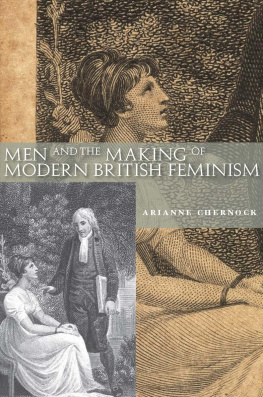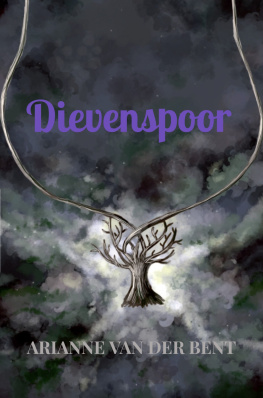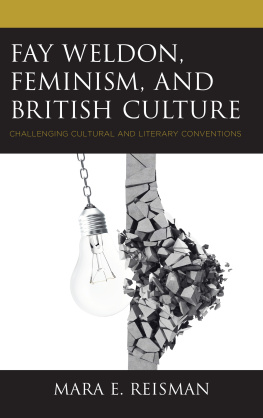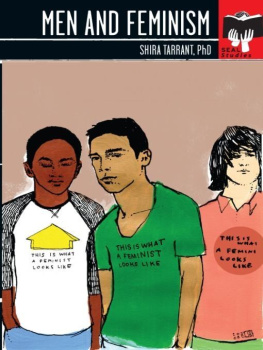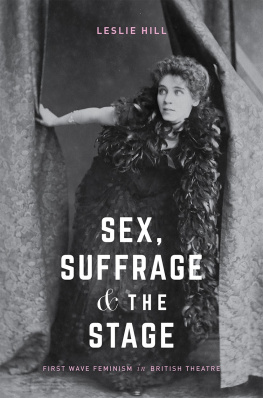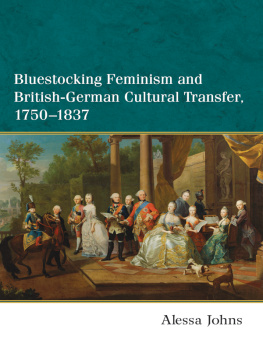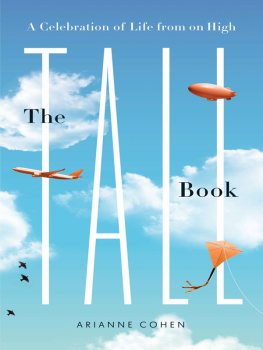This book has been published with the assistance of [Subsidy information pending].
Stanford University Press
Stanford, California
2010 by the Board of Trustees of the Leland Stanford Junior University
All rights reserved
No part of this book may be reproduced or transmitted in any form or by any means, electronic or mechanical, including photocopying and recording, or in any information storage or retrieval system without the prior written permission of Stanford University Press.
Chapter Two appeared in an earlier version as Cultivating Woman: Mens Pursuit of Intellectual Equality in the Late British Enlightenment in the Journal of British Studies 45, no. 3 (July 2006). Chapter Five appeared in an earlier version as Extending the Right of Election, in Sarah Knott and Barbara Taylor, eds., Women, Gender, and Enlightenment , 2005 (Palgrave); reproduced with permission of Palgrave Macmillan.
Library of Congress Cataloging-in-Publication Data
Chernock, Arianne.
Men and the making of modern British feminism / Arianne Chernock. p. cm.
Includes bibliographical references and index.
9780804772938
1. Male feministsGreat BritainHistory18th century. 2. FeminismGreat BritainHistory18th century. 3. WomenGreat BritainSocial conditions18th century. 4. Women in politicsGreat BritainHistory18th century. I. Title.
HQ1593.C48 2010
305.42081 094109033dc22
2009016052
Printed in the United States of America
on acid-free, archival-quality paper
Typeset at Stanford University Press in 10/13 Galliard
Acknowledgments
Countless individuals and institutions have helped me to tell this story, and it is a pleasure here to acknowledge their contributions. First, I would like to thank my dissertation committee at UC Berkeley, without whose support this book would have been impossible. Tom Laqueur provided incisive feedback throughout the research and writing process, always pushing me to ask bigger questions. Carla Hesse lent her theoretical expertise and deep knowledge of European gender and cultural history. Her work, which rigorously questions received narratives, has inspired much of my own scholarship. James Vernon helped me navigate a vast historiography, encouraging me to position my own research more precisely within the field. Perhaps more importantly, he offered camaraderie and coffee during my many visits to Berkeley. Catherine Gallagher gave me useful advice early on, by insisting that I examine novels and poems alongside philosophical, political, and religious texts. Finally, Barbara Taylor proved invaluable not only as an advisor but also as a scholar, mentor, and friend. Her enthusiasm and energy have been unflagging from this projects inception. In every way, she has been the champion of this book.
Boston University has been the ideal place to revise my manuscript. Over the past three years, I have benefited immensely from exchangesboth formal and informalwith my colleagues in the history department. I would especially like to thank Charlie Capper, Charles Dellheim, Barbara Diefendorf, Lou Ferleger, Fred Leventhal, Jim McCann, Brendan Mc-Conville, Eugenio Menegon, Jon Roberts, Jim Schmidt, Bruce Schulman, Nina Silber, and Jonathan Zatlin for their advice on various chapters, and Brooke Blower for her close reading of the entire manuscript. I am also grateful to Jim Schmidt for giving me the opportunity to rehearse my main arguments at the Enlightenment and the Origins of Feminism conference, held at Boston University in the winter of 2008.
Since I first began exploring this topic in 2000, a number of other individuals have also been exceptionally generous, with both their time and intellects. In the United States, Gina Luria Walker served as an incomparable guide to late-eighteenth-century Rational Dissent, and offered valuable suggestions on how to frame the book. Anna Clark and the anonymous reviewers of the Journal of British Studies helped me to refine the argument presented in Chapter Two, which originally had appeared as an article in that journals pages. Deborah Valenze offered a perceptive analysis of Chapter Four, and Lisa Cody provided an illuminating response to Chapter Five. In the United Kingdom, Michle Cohen gave me useful feedback on the entire project, both in its dissertation and book forms. Her insights into eighteenth-century education and gender were particularly helpful. Jane Rendall also offered penetrating critiques of this work at every stage of its development. I am particularly indebted to Jane for introducing me to Alexander Jardine and David Steuart Erskine, and for highlighting more generally the vital importance of the Scottish Enlightenment. John Barrell, Norma Clarke, Penelope Corfield, Kevin Gilmartin, Kathryn Gleadle, Tim Hitchcock, Margaret Hunt, Sarah Knott, Matthew McCormack, Clare Midgley, Philip Schofield, Jane Shaw, John Tosh, and Rosemarie Zagarri met with me over various lunches and teas on both sides of the Atlantic to discuss my work. All in their own ways helped me to clarify my argument further. Anthony Page and Dan White also provided timely assistance in fleshing out the religious worlds of my subjects.
I have been extremely lucky over the years to present my work to so many responsive audiences. I would especially like to thank the members of the Centre for Eighteenth Century Studies at the University of York; the participants in the Gender and Enlightenment Seminar at the Institute of Historical Research; attendees of the Enlightened Masculinities Colloquium and Gender and Enlightened Utopias Colloquium; the members of the Department of History at Dartmouth College (who also made Carson Hall feel like a second home) and the members of the University Writing Program at George Washington University; participants in the DC and Boston Area British Studies Reading Groups, and in Boston Universitys European Studies Seminar; Boston Universitys 20089 Humanities Foundation fellows; and my audiences at various Pacific Coast, Northeast, and North American conferences on British Studies, and at the Gender/Culture /Power Conference at the University of Strathclyde, the Thirteenth Berkshire Conference on the History of Women, and the International Society for Eighteenth-Century Studies Quadrennial Congress.
Researching this project could easily have been a daunting taskthe terms woman, female, sex, and equality rarely appear in card catalogues or indexes for eighteenth-century materials. That I found the experience highly enjoyable owes much to the librarians and archivists who helped me to conduct my research. These include the staff at the Bodleian Library (especially Bruce Barker-Benfield); the British Library (Rare Books Room); Cambridge University Library; the Colindale Library; Harris Manchester College, Oxford; Houghton Library, Harvard; the Huntington Library (especially Susi Krasnoo); the John Rylands University Library; the Library of Congress (European Reading Room); the National Library of Scotland; the New York Public Library; the Norfolk Public Record Office; Strathclyde University Library; the University of Edinburgh; the Warwick-shire Record Office; Dr. Williamss Library; and the Womens Library.
I have been fortunate to receive financial support from a number of institutions and organizations at various stages of my academic career. These have included the Andrew W. Mellon Foundation, the North American Conference on British Studies, the Department of History at UC Berkeley, the Center for Sexuality Studies at UC Berkeley, the Institute of International Studies at UC Berkeley, the Northern California Association of Phi Beta Kappa, the Huntington Library, and, most recently, the Humanities Foundation at Boston University. Their support enabled me to bring this book to completion.


